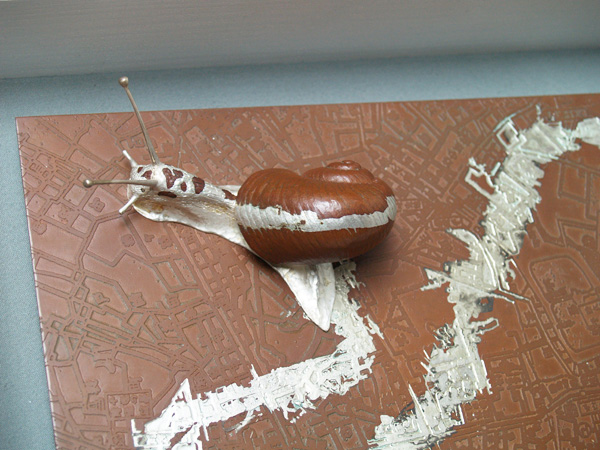Haruo MITSUTA & Jizai Specimen Box
日本語 English
Copper Silver
2005
Date&Material
Return Trip
Japanese common name of snails “Katatsumuri”, “Denden-Mushi” are not related to biological term, which are formally called “(various names)-Mai Mai”. It is supposed that “Denden” is the name corrupted that children saying “Dero, Dero -means ‘Come out, Come out’-” to snails.
In Japan, there are many cases that people idolized snails, e.g. there used to be a belief that the door snails inhabiting on the root of Giant Ginkgo Biloba Tree in the precincts of Ohkunitama Shrine (in Fuchu,-City, Tokyo), were approved to be brew and drank for producing breast milk. It is said the belief is from the aerial roots of Ginkgo Biloba sag down when it become a giant tree resemble to mothers’ breast, but it is considerable the door snails associated shells with breast milk.
In Chichibu district in Saitama prefecture, there is the spirit of snail named “Dairo-Shin” , supposed to be effective against the children’s running ears. This belief is rare, likely possible that the idea is from snail’s mucus and cochlea, and said that the shells of snails were dedicated to Hokora very small shrine-. *”Dairo” means snail, or slugs the definition depends on districts-.
The other example not related to folk remedy, there is the door snail belief around Kyushu district, which idolize Siebold-Kogiseru -Phaedusa sieboldtii- or Gyuriki-Giseru -Stereophaedusa addisoni-. These shells are strong against dehydration and hunger, could survive in the shell for months, so that are brought to travels and expedition as amulets, and replaced to the tree in the shrines after the return from the trip. Guusumiyoshi-Shrine in Shimonoseki-City in Yamaguchi prefecture has a similar belief, sells the amulets made of Siebold-Kogiseru.
Moreover, there was a belief called “Yonakigai” in Kyushu prefecture, was to put the shells under children’s pillows, supposed to be effective against children crying at night. After the recovery, the shells were returned to the tree.
Incidentally, snails are resistant to hunger and coldness. According to the experimental results, they could survive in the temperature of minus 120℃, and could sleep for 3 years to survive without any foods.
“Stick out the horns! stick out the spears! stick out the head!” quoted from a Japanese nursery rhyme, is actually about snails’ sex organs, are white shaped like spears named “Ren-Shi (means love arrow)”.
In this work titled “Return Trip”, the snail is going home leaving its viscous track on a map, represented by silver soldering . The viscous liquid is called Bingham Plastic, has viscousness and flowability make them able to move on oil and even on swords.
